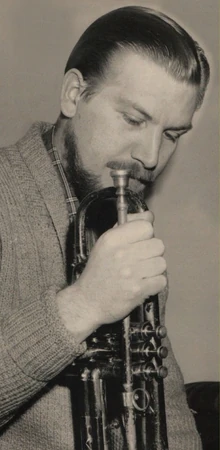
Kenneth Colyer (18 April 1928 – 8 March 1988) was an English jazz trumpeter and cornetist, devoted to New Orleans jazz. His band was also known for skiffle interludes. He was born in Great Yarmouth but grew up in Soho, London and served as a member of his church choir. When his elder brother Bill (1922—2009) went off to serve in World War II he left his jazz records behind, which influenced Ken Colyer. Colyer played with various bands and joined, in 1949, the Crane River Jazz Band (CRJB) . The band played at the Royal Festival Hall on 14 July 1951 in the presence of HRH Princess Elizabeth. Parts of that group merged with other musicians including Keith Christie and Ian Christie to form the Christie Brothers' Stompers. Colyer travelled to New Orleans, where he played with his idols in George Lewis' band. He was offered the job of lead trumpeter on a tour, but was caught by the authorities, detained and deported.
Colyer was invited to take the trumpet lead for the Chris Barber's Jazz Band and so formed the first line-up of Ken Colyer's Jazzmen: Chris Barber, Monty Sunshine, Ron Bowden (born Ronald Arthur Bowden, 22 February 1928, Fulham, London), Lonnie Donegan and Jim Bray (born James Michael Bray, 24 April 1927, Richmond, Surrey). They made their first recordings on Storyville in 1953. Colyer and the others parted company in 1954, each claiming in later years to have fired the other. (read more on wikipedia)
Links to Peel[]
Peel bought an EP by Ken Colyer's Jazzmen when he was 14 years old and both he and his producer John Walters were fans of their music. In 1958, Peel went to see Ken Colyer perform along with Chris Barber's Jazz Band and Lonnie Donegan at the Dominion Theatre in London.
Lonnie Donegan, who played banjo for Ken Colyer's group later had a successful solo career, with hit singles making him a star and the "king of skiffle". Donegan influenced many 60's musicians and a young Peel, who admired his music for the rest of his life.
Ken Colyer had a reputation in the trad jazz world somewhat similar to John Mayall's in the 1960s British blues scene. Both men were seen as purists who played their music in as authentic a style as possible, making no concessions to commercialism. Indeed, when traditional jazz bands began to have hit records in the UK in the early 1960s, Ken Colyer's band was not among them. Colyer continued working until his death in 1988, and one of the musicians in his later band, the bassist Alyn Shipton, became a noted author and BBC jazz presenter; but it was Colyer's early work which Peel favoured.
After Peel's death, a record from Ken Colyer was found in his record box, a collection of 142 singles, that was kept for him in case there was a fire at Peel Acres.
Shows Played[]
- 12 January 1988: Go Down, Old Hannah (LP - The Decca Skiffle Sessions 1954 - 57) Lake
- 27 January 1988: Casey Jones (LP - Back To The Delta) Decca
- 17 February 1988: The Thriller Rag (LP - Club Session With Colyer) Lake The Thriller Rag (LP - Club Session With Colyer) Lake (Peel flags upcoming 100 Club benefit for Colyer)
- 14 March 1988: Goin' Home (LP - New Orleans To London) Decca (Peel plays tracks by Colyer, who has just died, at the beginning and end of the show)
- 14 March 1988: Home Sweet Home (LP - Club Session With Colyer) Decca
- 02 May 1988: Blue Skies
- John Peel Remembers 1967: Blame It On The Blues ("In the clubs, there was still a lot of trad....")
- 1991
- 30 June 1991: Goin' Home
- 1995
- 17 February 1995: Wildcat Blues (7" EP - If I Ever Cease To Love) Tempo
- 25 February 1995 (BFBS): 'Wildcat Blues (7")' (Tempo)
- 2001
- 31 July 2001: 'If I Ever Cease To Love (7")' (Tempo) (JP: 'That was Ken Colyer and his Jazzmen from an EP that I bought when I was 14 years old. John Walters, who produced this programme for more than 20 years and who died the night before last, bought the same EP.')
- 2002
- 28 November 2002: Take This Hammer (LP - The Decca Skiffle Sessions 1954-57) Lake
- 2004
- 18 May 2004: 'Streamline Train' (78) - (Decca) (Pig's Big 78)
